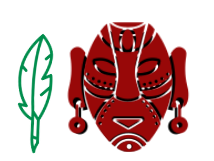Taino Chieftainess Champions Indigenous Food Practices Amidst Rising Imports
Editor’s note: In an exciting development, Writes and Kulcha was recently named the official media partner of the Yukayeke Yamaye Guani Taino Peoples at their New Year celebration. Our second article in this partnership highlights a pressing issue affecting Jamaica and the broader Caribbean: food sovereignty and security, and their relationship to the erosion of ancestral food heritage.

Edinburgh, Scotland– Jamaican Taino Kasike-iani (Chieftainess) Ronalda Pairman (Taino name: Kaiko Tekina) and her daughter, Tanama-Areyto recently visited Edinburgh to address the decline of Indigenous food practices in Jamaica at a forum on food sovereignty and security. It is said that approximately 70% of the food consumed on the island today is imported.

Over recent decades, globalisation has significantly altered Jamaicans’ dietary habits, as the island, like much of the world has adopted more modern eating habits due to globalisation, favouring fast and convenient foods over traditional, nourishing ancestral diets. This shift has led to a concerning decline in the cultivation and consumption of Indigenous foods and herbs such as yuca (cassava), ‘stinking toe’ (the fruit of the West Indian Locust tree), corn, pumpkin, pulses and medicinal plants like purslane, which are becoming increasingly rare and forgotten.

The Caribbean Food for Climate Justice (CFCJ) Research Group
In response to this crisis, the Yamaye Guani are part of the Caribbean Food for Climate Justice (CFCJ) Research Group. This collaborative effort includes scholars from The University of Edinburgh, The University of the West Indies, Heriot-Watt University, Wild Caribbean, practitioners and activists from the Caribbean Youth Environment Network, and educators from the 4-H Clubs of Jamaica. Together, they seek innovative ways to revive ancestral food heritage in the Caribbean as a solution to the interlinked crises of climate change, health, and food security.
Recipes for Resilience
The CFCJ Research Group’s initial project, ‘Recipes for Resilience’, connected British Caribbean youth with members of the Caribbean Youth Environment Network through stories and songs about Caribbean food cultures and their importance for climate action. This project produced a co-created song, “Food and Resistance for Climate Resilience,” along with Food Story Maps and short videos, which are available for open public access.
The group’s most recent endeavour, ‘Teaching Climate Justice and Resilience through Ancestral Plant Heritage in Jamaica’, has fostered a unique partnership with the Yamaye Guani and the 4-H Clubs of Jamaica. It includes the creation of a ‘Recipes for Climate Justice Cookbook’, which aims to raise awareness of the nutritional and sustainable benefits of Indigenous Caribbean foods.

The workshops organised by the CFCJ Research Group promote the cultivation and consumption of crops adapted to Caribbean microclimates. This not only conserves water, it also enhances food security and resilience against climate change. The group’s work challenges the colonial legacy that has shaped the Caribbean’s agricultural practices and diets, striving for climate justice that centres on the health and wellbeing of people and the planet.

Kasike-iani Speaks
On her visit to Edinburgh University, Scotland to represent Jamaica, Kasike-iani (Chieftainess) Pairman of the Yamaye Guani, addressed the structural and economic impact of the food security crisis in Jamaica. In her presentation, she underscored the global relevance of the issue and highlighted the urgent need for sustainable solutions rooted in ancestral knowledge.
During the event, Dr Marisa Wilson, Senior Lecturer in Critical Human Geography at the University of Edinburgh, concurred, emphasising the importance of food sovereignty over food security. She advocated for valuing sustainable spaces that are used for subsistence and local sale, rather than relying on the global market. Kasike-iani also highlighted the health risks associated with imported foods, pointing out that ancestral diets provide more traceable and healthier options.

Looking Ahead
The efforts of the CFCJ Research Group have caught the attention of documentary maker WaterBear, who plans to feature their activities in a series on grassroots communities and their creative resilience in the face of the climate crisis. This recognition further validates the importance of their work and the potential of ancestral food heritage to address contemporary challenges.
As Writes and Kulcha embarks on this new journey with the Yamaye Guani, we remain committed to highlighting the voices and initiatives that seek to reclaim and revitalise Indigenous food heritage. Our goal is to help in ensuring a sustainable future for Jamaica and the Caribbean.
We will continue to provide more updates and in-depth stories on this vital issue.

